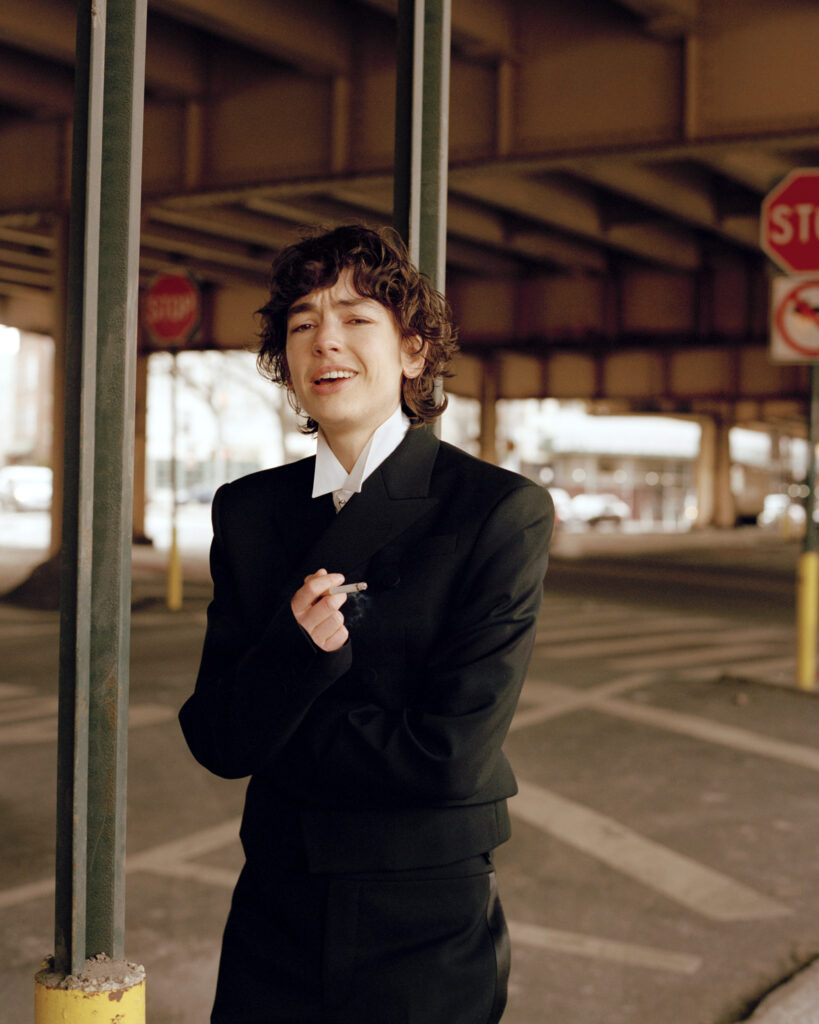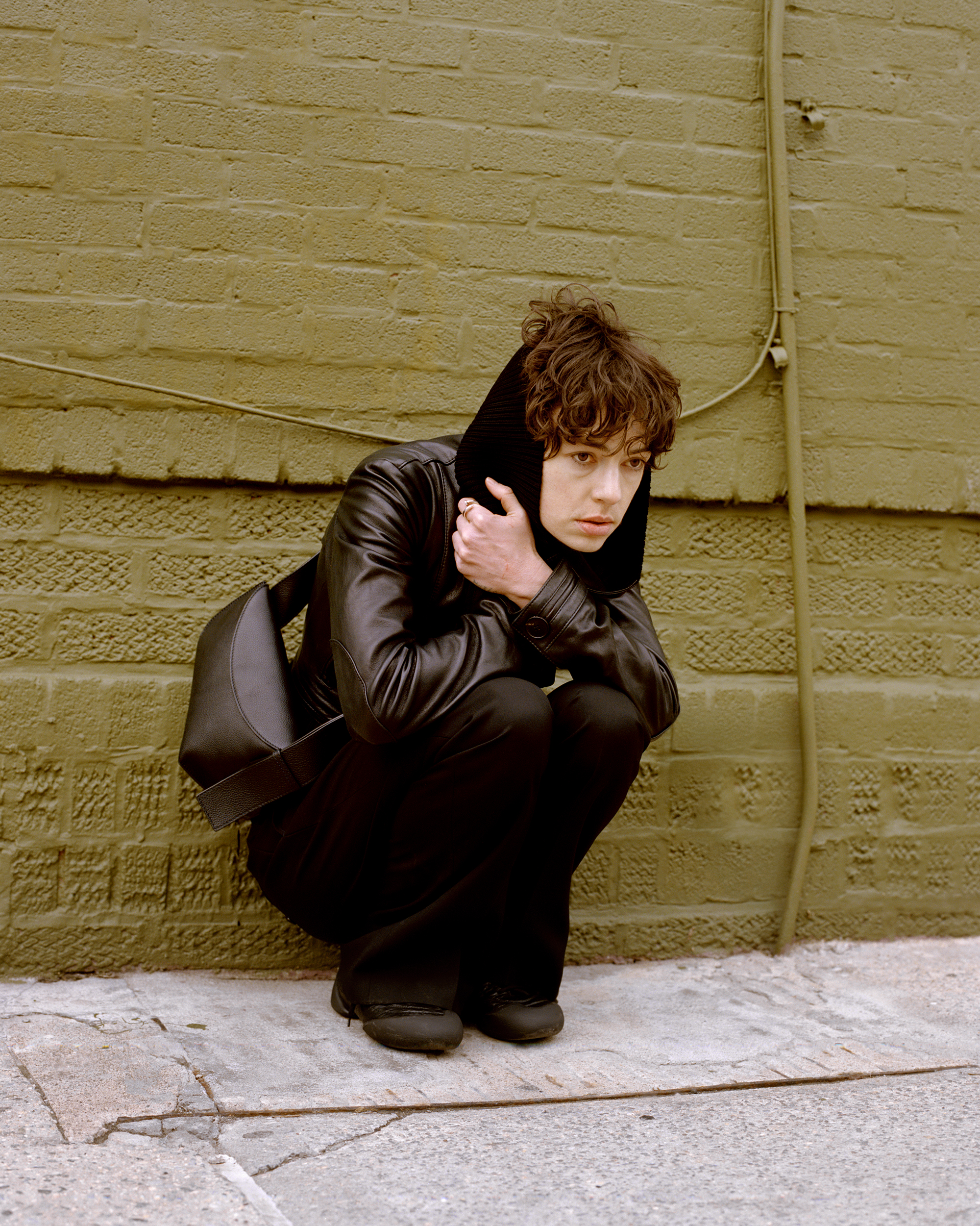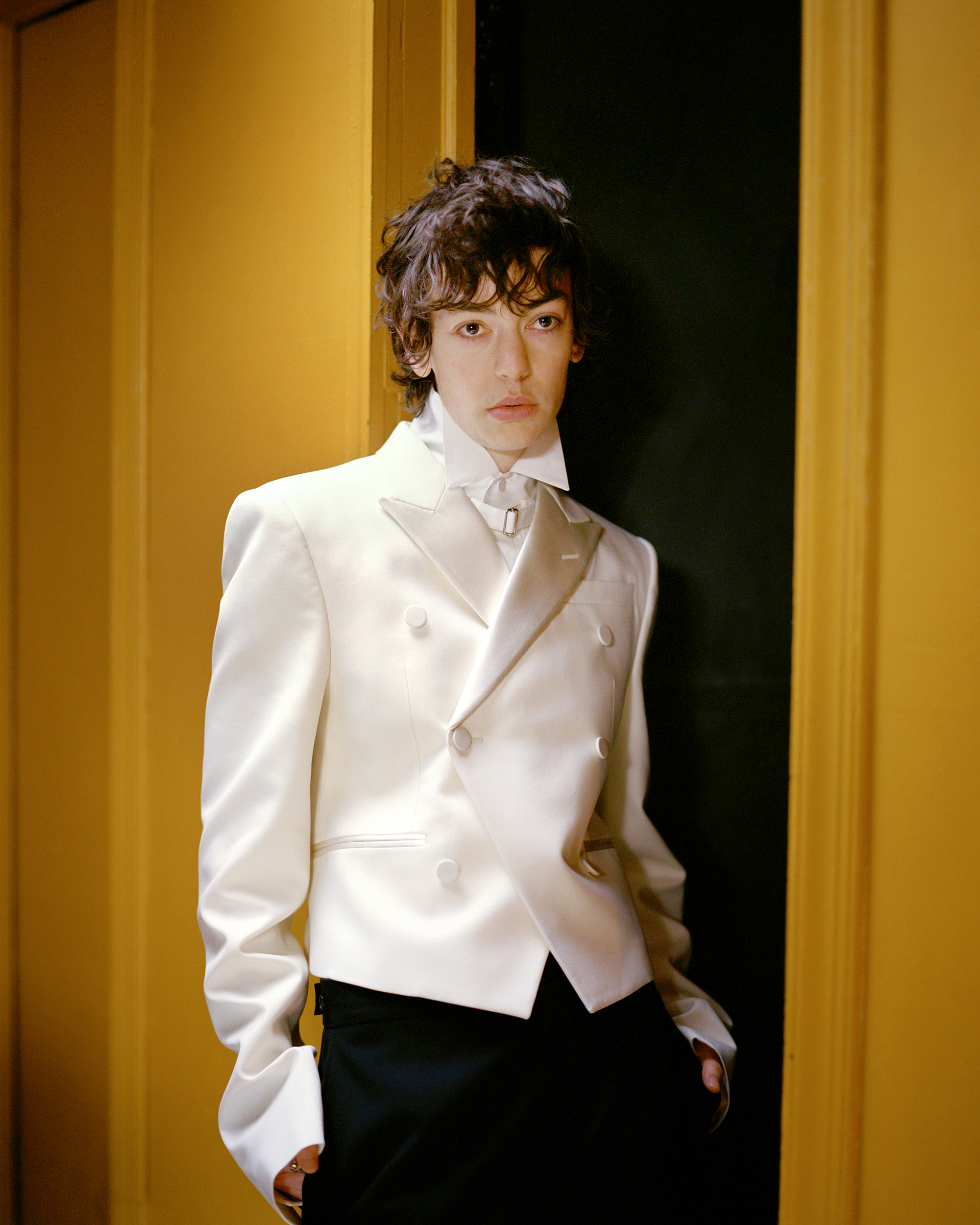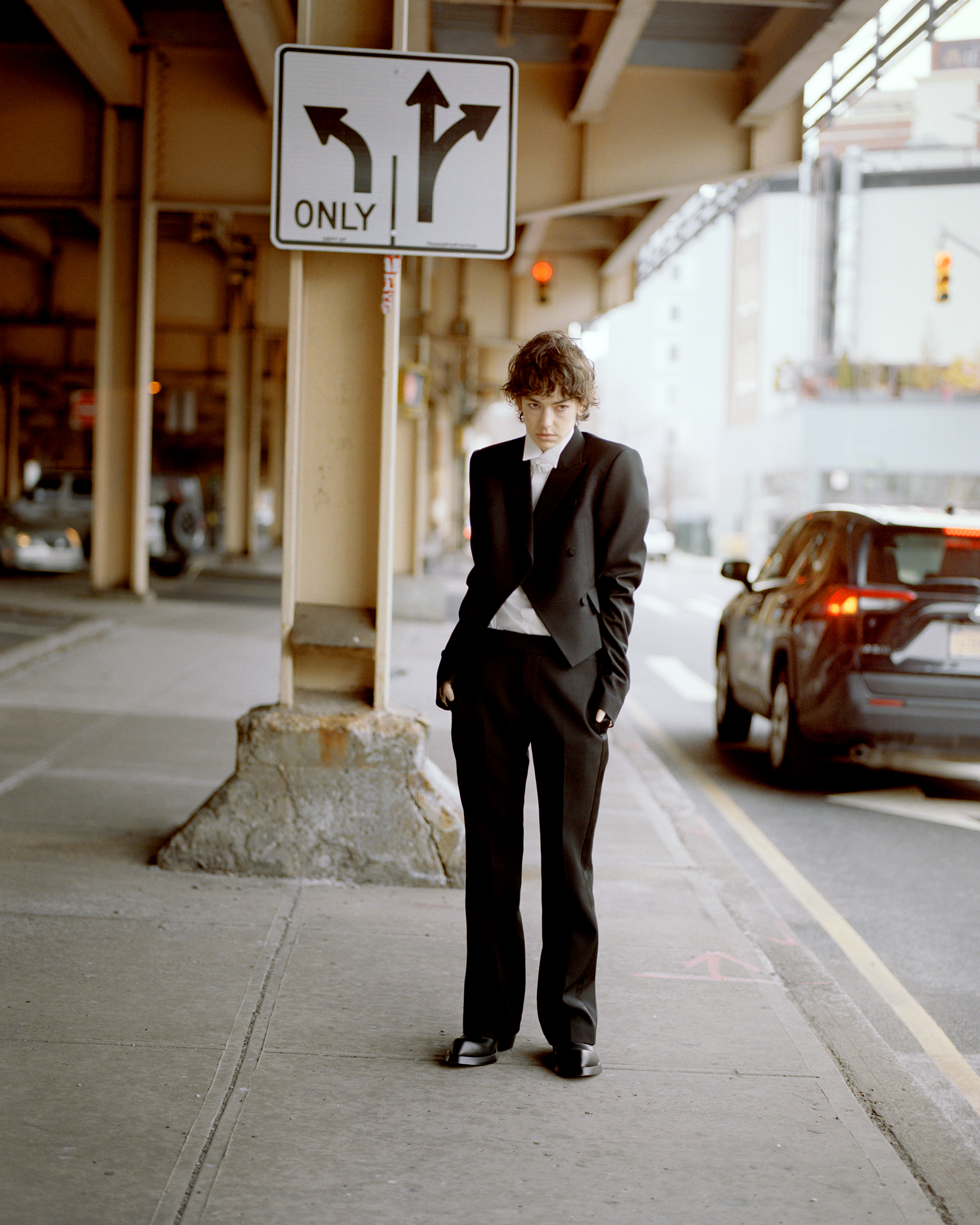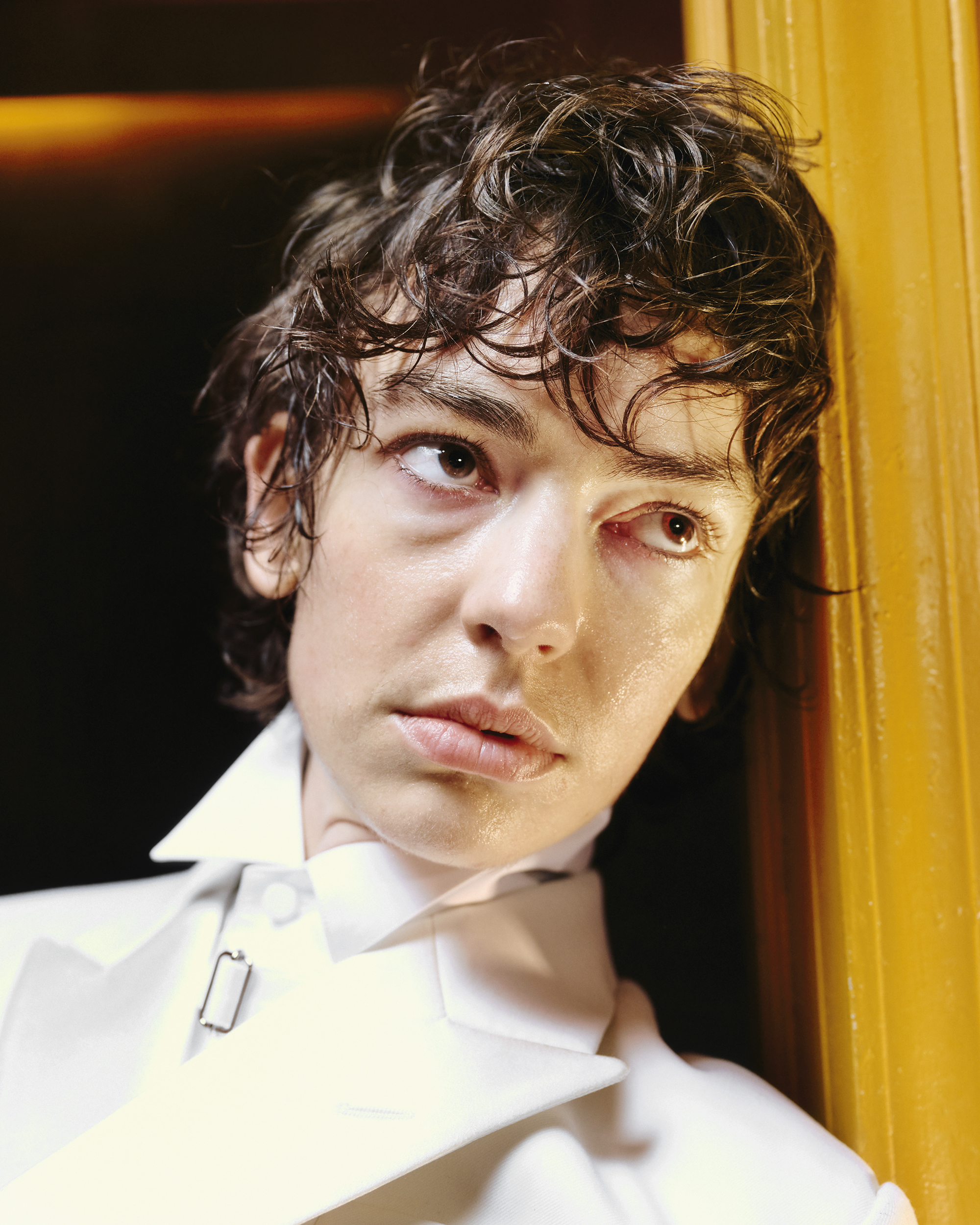Jack Haven may be known for their gut-punch performances in A24’s I Saw the TV Glow and Netflix’s Atypical, but for the 30-year-old Upper West Sider, acting is just one brushstroke on a much bigger artistic canvas. Whether sewing, painting, or directing October Crow—a feature shot entirely on iPhone—Haven is a natural-born truth teller. So when punk performance artist and musician Kembra Pfahler calls them up, the conversation covers everything from telepathy to trans rights—no filter, no fluff.
———
WEDNESDAY 10:30 AM FEB. 26, 2025 LA
KEMBRA PFAHLER: Hi, Jack.
JACK HAVEN: Hi, Kembra.
PFAHLER: How are you today? Do you want to speak about what you’re doing in Los Angeles?
HAVEN: Yeah. I also want to say that today is the two-year anniversary of the death of my dear friend Stephanie Rae Shafir. She died when she was 28. She’s so present in everything that I do, so I feel so supercharged to be here with her, and with you.
PFAHLER: It’s so incredible to be able to feel the presence of people that have gone to the other side. I really believe that they can be here with us, but my god, so young to have to leave.
HAVEN: So young. My friend—my daughter Alex McVicker, I remember her asking Steph, “Are you scared to turn 30?” Steph said, “No, I’ve already lived past my life expectancy. I would love to turn 30.” It was this incredible perspective on time. She knew how important each and every moment together was.
PFAHLER: My partner Colin de Land passed away from lung cancer. He was obsessed with collecting watches and clocks. His perception of time was so different because he had to leave when he was very young. He passed away when he was 47, but every minute that he was breathing was a festival of joy. I’ve only been visited by him once since he died, but it’s really incredible how people that have gone are still in our lives. Let’s do this in Stephanie’s honor.
HAVEN: Yes. Thank you, Kembra. In Stephanie and Colin’s honor.
PFAHLER: Yeah. I think about Colin every single day.
HAVEN: I think about Steph every day, too. She’s so much more a part of my body and mind than she was when she was alive. Now she’s inside of me every time I breathe.
PFAHLER: I feel that way as well. There’s that thing when people transmigrate—they go up into the ether and explode into many particles, and then find their second and third lives inside the bodies of others.
HAVEN: Yeah. I love living and being alive, but I’m very curious about death. I’m so grateful that we can’t know. I’m so grateful there’s that secret.
PFAHLER: When I first met you in Paris, your energy and your presence was so shocking to me. I’m from Los Angeles and my aunt was a casting director, so I grew up around people in movies and TV. I never ever, ever, ever could connect with anyone in movies or TV. You’re such a different paradigm for an artist and an actor and a director, which is very exciting to me.
HAVEN: That’s very kind of you to say, because I felt the same. When you walked in I was absolutely blown back. Who is this legend? Of course, not only did I know you, but I was reading a book with you on the cover. It was like this fairytale of you stepping out of another world. You exist in another dimension, in part because you’re so vulnerable and so open and so loving. I heard this from many people after we met, that you adopt people and make them feel so included in the underground scene in New York. I was just watching videos this morning of the Voluptuous Horror of Karen Black, because I’ve never gotten to see you live. You’re such a rock star.
PFAHLER: Oh, no big deal. Don’t you feel like it’s such a luxury and privilege to be able to wake up and do your artwork and see projects through?
HAVEN: Yep.
PFAHLER: You just made a feature. I can’t even imagine how much work that took. Can we talk about October Crow?
HAVEN: Of course. The story was born from the relationship between Alex McVicker, who plays Bella in the film, and Peter Nolan Smith, who plays James Steele, which is his alter ego. He lived in Thailand under that name for 20 years as a bootleg Ferrari t-shirt salesman. My mom, Laura Lundy, is an actress, and she plays La Bruja in the film—she’s sort of the villain. I shot it on my phone. It’s 74 minutes. It’s scored by Mina Walker, who’s my best friend and in the band Daisy the Great, and Avsha, who’s in the band Lowertown. It was a collective effort. It’s a style of filmmaking that I want to pursue, which is just total scrap, whatever is around. It’s the mentality I’ve been trying to cultivate, because I really believe you have to create an anti-capitalist mindset to be able to deliver what’s in your soul, artistically. You can’t mess it up with buying stuff.
PFAHLER: Well, there’s so many great surprises that occur when you’re financially, I guess not challenged, because I think we’re still very fortunate—not every human being on the planet has an iPhone. But don’t you find that the spirit of invention is so much more extreme when things don’t come so easily?
HAVEN: I do. I think it comes from a childlike mentality. It’s so easy, but it’s also deeply painful to get swept up in the hierarchical status games that are presented, because you get invited to parties, and soon you’re at dinners every night, and you kind of forget that you’re a real autonomous being that can say“no.”
PFAHLER: Yeah. I know that a lot of us have to take jobs sometimes that we don’t love to death. Georges Bataille worked as a librarian. But I think it’s important for everyone to have, I hate to say a moral compass, but not that many people have a moral compass around their decisions and their art.
HAVEN: Yeah. I’ve been very lucky. I live with my mother’s friend now on the Upper West Side.
PFAHLER: Really? I lived on 106th and West End Avenue. I love it up there. There’s so many strange stories and strange buildings in that area.
HAVEN: Yes, they’re really great apartments. What kind of environments do you feel inspired by?
PFAHLER: Because I’m 63 now, I have a lot of gratitude just for being healthy. I’m very codependent with my parents, so usually if my parents are doing okay, my spirits are lifted. Beyond that, I like to go to band practice. I have a studio on 2nd Street. I like to sing and I have a piano in my apartment, so playing songs really lifts my spirits a lot. I also love going to the beach. I swim at Coney Island in the winter.
HAVEN: Do you wear a wetsuit?
PFAHLER: No.
HAVEN: You swim in a bikini in Coney Island in the winter?
PFAHLER: I don’t wear a bikini. I’m in trunks.
HAVEN: You’re in trunks.
PFAHLER: Do you have an athletic practice, Jack, in your art life? Is that important to you?
HAVEN: Yes. I started running more because I played a runner on a show [Atypical] for four years.
PFAHLER: That was a wonderful TV show. I learned so much watching you on that show.
HAVEN: Thank you. Learning about the autism community, and the beauty and connection to these other worlds that exist through autism, I feel so grateful. I met a few spellers who, if you’ve been listening to the Telepathy Tapes—
PFAHLER: Can you explain what a telepathy tape is?
HAVEN: It’s a podcast that was very popular a few months ago. It’s a researcher who has been learning about the non-speaking autistic community, who often are called spellers because they spell out what they want to say using technology like a board or an iPad. A lot of people doubt it the way they doubt a Ouija board, because often the spellers need an aid to hold their hand while they spell out what they want to say. The podcast is documenting the lives of different spellers and the similarities and differences. Across the board, all of the people who are studied for this podcast report telepathy, being able to read the minds of their peers. Oftentimes, it’s their mother. They talk about this meeting place that is in another dimension that’s called The Hill. Most of the spellers mention it at one point or other, separately from each other.
PFAHLER: That’s incredible.
HAVEN: Yeah, it’s really amazing. I took a class with Wendy L’Belle-Tividad two days ago. She’s a clairvoyant. It was a class of 40 people on Zoom, but she talked a lot about accessing the field of information. Then, we were split up in pairs and read for each other, starting first by just looking at each other’s eyes and watching as our faces changed. It was amazing because you could see the face morph into different versions of this person. Then we focused on a candle flame and sent energies towards each other’s third eye and let whatever came to us about the person come out. You have to do this incredible thing of trusting yourself and moving through the voice of every skeptic. Skeptics are so funny to me. Saying no to magic is so funny. [Laughs] I don’t know why you would choose to do that.
PFAHLER: Yeah. We’re going through a very toxic, terribly deformed period of believing in all these horrible sky-god religions. We had some stability around that, and now everyone is like, “No, Noah’s Ark did exist.” All those delusional religious ideologies are so popular now. I find it to be very tragic.
HAVEN: Why do you think that is?
PFAHLER: I think that the one percent, the people that are being heard, are so afraid that they’re going to lose the material shit that they have. It’s just fear. Their value system is accepting of hatefulness and fascism. Not that many people are even willing to speak out against the hate that’s spreading across the United States. Unless they can articulate with great perfection what’s wrong politically, people won’t speak up at all.
HAVEN: I think there’s a lot of bravery in just throwing yourself into maybe being wrong. I’m thinking of Audre Lorde’s poem that ends with, “We must speak in order to survive.”
PFAHLER: Callen-Lorde really saved my life in New York in the ’80s during the AIDS epidemic, when there was that World War III loss of friends. They’ve saved so many lives, and I hope that they don’t get closed down in the next decade. I hope they can survive this attrition that’s happening with everybody being scared shitless of the trans community.
HAVEN: It’s really ridiculous, because most people don’t care personally either way. It’s just a loud tool.
PFAHLER: I don’t mean to skip subjects so rudely. How long are you in Los Angeles for?
HAVEN: I’m here until the end of the month. We’re showing October Crow on March 1, as well as a documentary that my friend Deja Spears is editing of Kreayshawn’s home videos.
PFAHLER: Okay.
HAVEN: Kreayshawn’s a rapper from the Bay Area, where I’m from. She was really big when I was growing up. I was her for Halloween one year.
PFAHLER: Where in the Bay Area are you from?
HAVEN: I was born in Portland, Oregon, and then moved to Alameda and was raised there. It’s a little island, like, half landfill, right between Oakland and San Francisco.
PFAHLER: I remember. I used to do gymnastics when I was a child. I lived in Mill Valley and I’d always go to Alameda to do gymnastic meets.
HAVEN: Wow. I also did gymnastics in Alameda.
PFAHLER: I’m glad I did that because it just changed my whole muscular physiognomy. It never has left.
HAVEN: I feel like your performance is still very gymnastics, the way that you move onstage.
PFAHLER: Jack, did you ever see any of the Andy Warhol Interview magazines, the really old ones?
HAVEN: Of course. I had a huge phase of being obsessed with Fran Lebowitz. This was a sickness, a dreaming-of-her-every-night, walking-around-thinking-about-her phase. She worked at Interview and I remember the story of her knocking on the door for the job. They said, “Who is this?” And she said, “It’s Valerie Solanas.”
PFAHLER: [Laughs]
HAVEN: Andy opened the door himself.
PFAHLER: Oh my god. Such a great book, Society for Cutting Up Men [SCUM Manifesto]. Whoosh.
HAVEN: I’ve never read it cover to cover but I’ve flipped through it. [Laughs] I need to say it in this interview, because I really want to warn people: Maybe don’t get married to cis men. I just want to put that out there.
PFAHLER: Of course. I don’t know if you know this about me, but I’m anti-marriage and I’m anti-natalist as well.
HAVEN: Does that mean anti having kids biologically?
PFAHLER: Yeah. I feel that there’s such an abundance of children that don’t have homes. I just can’t figure out why you feel the need to replicate yourself. Vanity is the enemy of interpretation. Why are you in opposition to cis-man marriage?
HAVEN: Because it’s a dangerous time. I’ve witnessed the way that masculinity is shifting and feeling more entitled.
PFAHLER: Getting married to a cis man is the equivalent of watching someone shove 100 Big Mac cheeseburgers down their throat and then throwing up. It’s the greed and the necessity to consume another person as we’ve lost all of our rights.
HAVEN: Yeah.
PFAHLER: There’s going to be a time when the question is asked, “What side of history were you on in 2025?” I hope people really feel the shame and responsibility for electing the current POTUS.
HAVEN: And for the genocide of Palestine. I think they’re intricately intertwined, all of these struggles.
PFAHLER: Don’t you find it a little bit shocking that no one’s vocally in opposition? It’s such a quiet time because of the fear that’s blanketed us. I’m dreaming of a day when the entire globe falls in love and we all work together, but I can’t think of any other way to be vocal about change besides making art. What are you doing to remain sane during these difficult times? Do you have anything you’d like to share with artists who are just starting?
HAVEN: I think the first thing is to really devote yourself to the people that you believe in. I think you have to create a family with your friends that is as devoted as we’re taught a nuclear family should be. Then I think you should try to work with your hands. What’s keeping me the sanest right now is sewing. The way I’m making money recently is going to the Goodwill Outlet every week, bringing home clothes, and then altering them.
PFAHLER: Oh really?
HAVEN: Yeah. It’s actually very difficult to sew. My daughter and I are both learning now. I’ve also been thinking about David Lynch and his routines, eating chicken and broccoli every single night, taking care of your body like an autonomous thing or an animal so that your creative consciousness can have more room to fill itself up with differences. There’s more space when your body is stable and in routine.
PFAHLER: I don’t know that much about David Lynch, but I remember when he started his transcendental meditation phase of his life and my daughter wanted to study with him. I always remember this feeling of never having the courage to learn about TM through David Lynch. The idea of going inside of that mind space with David Lynch was absolutely horrifying to me for some reason.
HAVEN: I understand. But what I’m most curious about now is physics. I think I was given this gift by Stephanie because it was something she studied. I’ve found a teacher and I want to understand more about the universe. Time and space are interconnected, as we know.
PFAHLER: I’ve never met anyone who studies as much as you do. It’s incredible. Do you have a dream place you’d like to go to?
HAVEN: Yes. I’d like to travel to Nepal and walk with a sherpa over the Himalayan Mountains.
PFAHLER: Oh my god, that’d be incredible.
HAVEN: Yeah. I have to shout-out Peter, my dear teacher and friend. If I tell him that I’m curious about a place, he’ll make me get out my atlas and walk me through what it was like.
PFAHLER: Wow. So I haven’t seen October Crow, but I’m dying to. I’ve seen images—your casting was so diverse. You had such an interesting group of people in your film. Was that an enjoyable process?
HAVEN: Yeah. Peter lived upstairs from Alex and I; we’d been friends for four years. We really made the movie for him because he had liver cancer and we thought he was dying. The first day we shot was in the hospital, and then he ended up getting a liver on Christmas Eve. He has his surgery scars at the end.
PFAHLER: Wow.
HAVEN: One of the other actors in the film is his friend Larry Fleischman who does a lot for the Theater of the New Audience. His friend Catherine is a gallery owner. He sent me a photo of her once and said, “Bureaucratic top?” We were sort of casting a story that no one knew but me, so he was send- ing me whoever he thought was interesting.
PFAHLER: God. That is such an amazing story. Would you ever consider being a special guest on a Karen Black song?
HAVEN: I would die for it.
PFAHLER: If you feel like it, you could do anything you like. You could play the flute, you could play the congas, you could sing. It’s a very, very flexible environment— we’re recording in a big recording studio, which is kind of fun because most people can make records in their houses now. Even if you’re not in the recording, Jack, I hope you’ll come by. Let us honor you because you give me a lot of hope. Your courage and your intelligence is mind-bending. I’m not trying to blow smoke up your tushy either.
HAVEN: Kembra, the honor would be mine to come and watch you perform. You are a legend. I am so grateful to have been able to talk to you today.
PFAHLER: I can’t wait to see the photos, Jack, and Interview magazine, I’m so glad that it still exists. Thanks to Mel for working so hard.
HAVEN: We love you, Mel.
———
Hair: Kabuto Okuzawa using Oribe at Walter Schupfer Management.
Makeup: Ayami Nishimura.
Tailor: Maria Del Greco.
Photography Assistant: Rebecca Steighner.
Fashion Assistant: Nicholson Baird.
Production Coordination: Claudia Malpeli.
Location: Animal.
Content shared from www.interviewmagazine.com.

